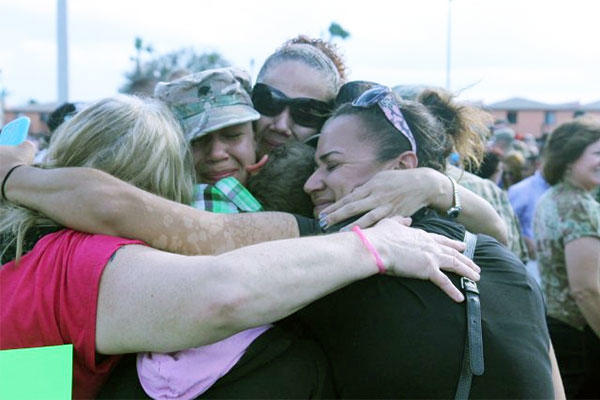The Deployment Stage
- Mixed emotions/relief
- Disoriented/overwhelmed
- Numb, sad, alone
- Sleep difficulty
- Security issues
- Time frame: first month
This stage is the period from the Soldier's departure from home through the first month of the deployment.
A roller coaster of mixed emotions is common during the deployment stage. Some military spouses report feeling disoriented and overwhelmed. Others may feel relieved that they no longer have to appear brave and strong. There may be residual anger at tasks left undone. The Soldier's departure creates a "hole," which can lead to feelings of numbness, sadness, being alone or abandonment. It is common to have difficulty sleeping and anxiety about coping. Worries about security issues may ensue, including: "What if there is a pay problem? Is the house safe? How will I manage if my child gets sick? What if the car breaks down?" For many, the deployment stage is an unpleasant, disorganizing experience.
On the positive side, the ability to communicate home from Bosnia, or any other site, is a great morale boost. The Defense Satellite Network (DSN) provides Soldiers the ability to call home at no cost, although usually for a fifteen-minute time limit. For some Soldiers, who are unwilling to wait on line, using commercial phone lines is an option. Unfortunately, it is common for huge phone bills to result, which can further add to familial stress. Another potential source of anxiety for Families is that several weeks may pass before Soldiers are able to make their first call home.
For most military spouses, reconnecting with their loved ones is a stabilizing experience. For those, who have "bad" phone calls, this contact can markedly exacerbate the stress of the deployment stage and may result in the need for counseling.
One possible disadvantage of easy phone access is the immediacy and proximity to unsettling events at home or in theater. It is virtually impossible to disguise negative feelings of hurt, anger, frustration and loss on the phone. For example, a spouse may be having significant difficulty (children acting out, car breaking down, finances etc.) or a Soldier may not initially get along with peers or a supervisor. Spouse and Soldier may feel helpless and unable to support each other in their time of need. Likewise, there may be jealousy towards the individual(s) whom the spouse or Soldier do rely on, or confide in, during the deployment. These situations can add to the stress and uncertainty surrounding the deployment. Yet, military Families have come to expect phone (and now even video) contact as technology advances. However, most report that the ability to stay in close touch - especially during key milestones (birthdays, anniversaries, etc.) - greatly helps them to cope with the separation.





















